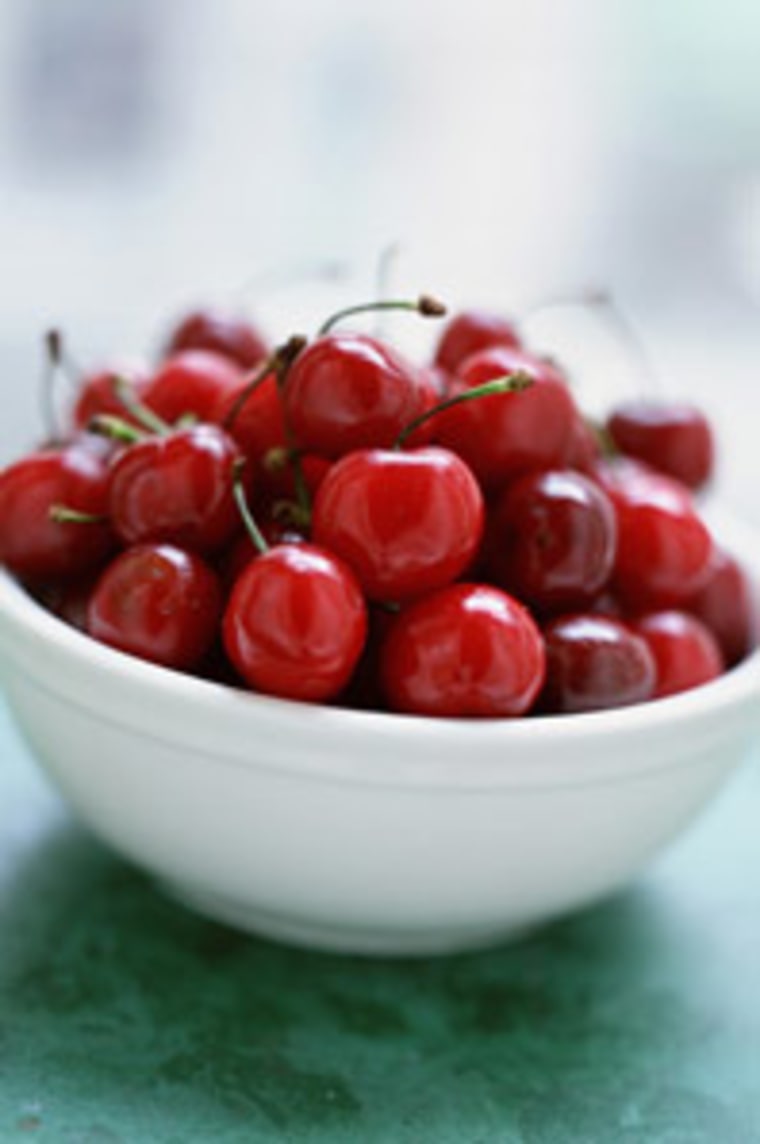For decades, cherries slid by on reputation only. The tangy little orbs of deliciousness have been credited with an array of health advantages, from soothing gout and arthritis to helping with a good night’s sleep.
Without hard data, though, such claims were dismissed as proverbial old wives’ tales.
Well, sometimes old wives know what they’re talking about.
“It was always anecdotal, but it’s been reported so frequently, by so many different people, that you have to think there may be something to it,” says Dr. Russell J. Reiter, professor of neuroendocrinology at The University of Texas Health Science Center in San Antonio.
Reiter recently put some hard science behind the cherry folklore. He conducted a five-month study and found that tart cherries contain significant amounts of melatonin — a hormone produced in the brain’s pineal gland that has been credited with slowing the aging process, and fighting insomnia and jet lag. It’s also being studied as a potential treatment for cancer, depression and other diseases and disorders.
The findings mark the first time melatonin has been pegged as a naturally occurring substance in food, although trace amounts are evident in bananas, corn and other foods, Reiter says.
“The combination of antioxidants in cherries can be very beneficial,” Reiter says.
Feeling fruity
While Reiter’s study gave cherries some health bonafides, Patricia Leischner already knew the fruit was making her feel better.
Leischner, 63, lives on a farm about 25 miles north of Springfield, Ill., and has suffered from back trouble — she had surgery in 1996 — and arthritis for years.
“My problem was I couldn’t get my hose on, my husband always had to help me with my hose,” Leischner says. “In the mornings I’d awaken with pain in my back. If I tried to clap with my hands, I couldn’t because of my big arthritic knuckles.”
Last year, a friend recommended CherryFlex, soft gel tablets made from tart red cherries. Leischner, who plows the fields in a tractor, says the results were quick, and significant.
“The pain is not there like it was before,” she says. “The natural melatonin helps my sleep pattern, too.”
CherryFlex is manufactured by Flavonoid Sciences, a company in Traverse City, Mich. — the heart of America’s cherry country — founded by Bob Underwood, a cherry farmer for four decades who is credited with creating tart cherry pills for daily use.
“There is such a huge push now in our health system, not only how long you live but also the quality of your life while you’re alive,” says Underwood, 67. “I firmly believe that there’s absolutely no doubt the compounds in these cherries, if taken on a daily basis, definitely have an impact on joint inflammation. And the amount of antioxidants is good for the immune system and other things that don’t have anything to do with that kind of pain and gout.”
The key is the fruit’s skin and pigmentation, where antioxidants called anthocyanins are found. A 1999 study at Michigan State University found that the antioxidant activity of tart black cherries is greater than that of Vitamin E, according to the Moss Report, a cancer treatment and referral service.
Not the pits
Cherries have been popular snack for centuries. In America, French settlers planted pits near the St. Lawrence River and the Great Lakes as they settled there, eventually founding Detroit and other cities in Michigan. A Presbyterian minister, Peter Dougherty, planted cherry trees near Traverse City, and the state’s first commercial tart cherry orchards were established near that spot at Ridgewood Farm, in 1893.
Underwood says cherries have been associated with pie and other deserts long enough, and “now it’s time to take a look at the other side, the healthy side.”
For Leischner, the fact that she’s using a natural product, and not a medicinal remedy that “gives you a druggy feeling,” is a big plus. “Natural” is a top selling point whether you’re using cherry concentrate or just grabbing a bunch of cherries to munch, says Andrew Lapointe, director of marketing for Traverse Bay Farms, which sells Fruit Advantage tart cherry juice concentrate and capsules under a “The Art of Healthy Eating” banner.
“It’s certainly a better alternative than fast food, for example,” Lapointe says. “There’s more interest in living a healthy lifestyle, and that can mean grabbing cherries by the handful for a quick snack. There’s a definite trend in society where people are wanting to eat healthier, and this fits right in with what folks are looking for.”
Bob Trott is a freelance writer based in Seattle.
